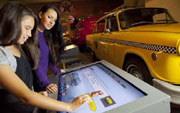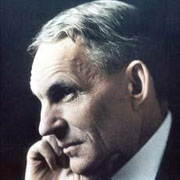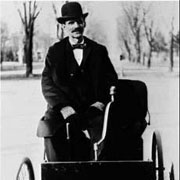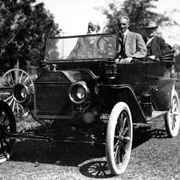VOA慢速英语2012People in America--Henry Ford, 1863-1947: He Created the Ford Motor Company and Revolutionized the Automobile
搜索关注在线英语听力室公众号:tingroom,领取免费英语资料大礼包。
(单词翻译)
People in America - Henry Ford1, 1863-1947: He Created the Ford Motor Company and Revolutionized the Automobile2
RAY FREEMAN: People in America -- a program in Special English on the VOICE of America.
Every week at this time, we tell the story of a person was important in the history of the United States. Today Steve Ember and Frank3 Oliver begin the story of industrialist4 Henry Ford.
(MUSIC)
STEVE EMBER: Many people believe Henry Ford invented the automobile. But Henry Ford did not start to build his first car until eighteen ninety-six. That was eleven years after two Germans -- Gottlieb Daimler and Karl Benz -- developed the first gasoline5-powered automobile.
Many people believe Henry Ford invented the factory system that moved a car's parts to the worker, instead of making the worker move to the parts. That is not true, either. Many manufacturers6 used this system before Ford.
What Henry Ford did was to use other people's ideas and make them better.
Others made cars. Henry Ford made better cars. And he sold them for less money. Others built car factories. Henry Ford built the biggest factory of its time. And he made the whole factory a moving production line.
 |
| Visitors explore America's automobile history at The Henry Ford museum in Dearborn, Michigan |
Henry Ford had great skills in making machines work. He also had great skills as an organizer. His efforts produced a huge manufacturing7 company. But those same efforts almost ruined the company he built.
FRANK OLIVER: Henry Ford was born on a farm in the state of Michigan on July thirtieth, eighteen sixty-three. The farm was near the city of Detroit.
Henry was always interested in machines. He was always experimenting with them. He enjoyed fixing clocks. And he helped repair farm equipment. When Henry was sixteen years old, he left the family farm. He went to Detroit to learn more about machines.
In eighteen seventy-nine, when Henry began work in Detroit, the city was a center of industrial development. Travelers could tell they were near Detroit by the cloud of smoke that hung over the city. Detroit was a center of iron and steel making. Nearby mines of lead and salt brought chemical companies to the city. And Detroit's copper8 and brass9 business was the largest in the world.
 |
| Henry Ford also became a newspaper publisher, bought a railway, built airplanes and even ran for the United States Senate10 |
One thing Henry Ford learned11 in Detroit was to have the right tool to do the job. It was something he would never forget.
STEVE EMBER: After three years in Detroit, Henry returned to his family farm. He remained on the farm until he was thirty years old. But he was not a real farmer. He was a machine man. A nearby farmer, for example, had bought a small steam engine to be used in farming. The machine did not work correctly. Henry agreed to try to fix it. At the end of just one day, Henry knew everything about the machine. And he made it work again.
Henry remembered that time as the happiest in his life. He said: "I was paid three dollars a day, and had eighty-three days of steady work. I have never been better satisfied with myself. "
Another thing that made those days happy was meeting a young woman. Her name was Clara Jane Bryant. Years later Henry said: "I knew in half an hour she was the one for me." They were married in eighteen eighty-eight, on Clara's twenty-second birthday.
FRANK OLIVER: Henry and Clara lived on a farm near Detroit. But, still, Henry was not a real farmer. He grew some food in a small garden. And he kept a few animals. But he made money mostly by selling trees from his farm. And he continued to fix farm equipment. It was really machines that he loved.
In eighteen ninety-one, Henry visited Detroit. There he saw a machine called the "silent otto. " It was a device12 powered by gasoline. It had been developed by a German, Nikolaus August Otto. He was one of the men who had worked with Gottlieb Daimler, who developed the first gasoline-powered automobile.
 |
| Henry Ford is shown on his first vehicle, the Quadricycle, in 1896 |
The silent otto did not move. But Henry saw immediately that if the machine could be put on wheels, it would move by itself.
He returned home to Clara with an idea to build such a machine. He was sure he could do it. But the machine would need electricity to make the engine work. And Henry had not learned enough about electricity. So he took a job with an electric power company in Detroit. Henry, his wife Clara, and his young son Edsel moved to the city.
STEVE EMBER: While Henry worked for the power company, he and a few other men developed a small engine. In June, eighteen ninety-six, Henry had his first automobile. He called it a "quadricycle." It looked like two bicycles, side by side. It had thin tires like a bicycle. And it had a bicycle seat.
In eighteen ninety-nine, Henry resigned from the power company to work on his automobile. He won the support of a small group of rich men who formed the Detroit automobile company. By the start of nineteen-oh-one, however, the company had failed.
Another man might have decided13 that the automobile business was not the best business for him. He might have stopped. Henry Ford was just getting started.
FRANK OLIVER: In the early days of the automobile, almost every car-maker raced his cars. It was the best way of gaining public notice. Henry Ford decided to build a racing14 car.
Ford's most famous race was his first. It also was the last race in which he drove the car himself.
The race was in nineteen-oh-one, at a field near Detroit. All of the most famous cars had entered. And all withdrew15, except two. The Winton. And Ford's. The Winton was famous for its speed. Most people thought the race was over before it began.
The Winton took an early lead. But halfway16 through the race, it began to lose power. Ford started to gain. And near the end of the race, he took the lead. Ford won the race and defeated the champion. His name appeared in newspapers. His fame began to spread.
STEVE EMBER: Within weeks of the race, Henry Ford formed a new automobile company. He left soon after, however, because he could not agree with the investors18. He had no trouble finding19 new ones.
Henry continued to build racing cars. His most famous cars of the time were the "Arrow" and the "Nine Ninety-Nine. " Both won races. And they helped make the name Henry Ford more famous.
Henry used what he learned from racing to develop a better engine. In nineteen-oh-three, he was ready to start building cars for the public. On July fifteenth, nineteen-oh-three, a man named Doctor Pfenning bought the first car from the Ford Motor Company.
 |
| American industrialist Henry Ford and inventor Thomas Edison (in back) are seen in one of Ford's automobiles20 in this 1914 photo. The man on the left is unidentified |
FRANK OLIVER: The sale to Doctor Pfenning was the beginning of a huge number of requests for Ford cars. By the end of March, nineteen-oh-four, almost six hundred Ford cars had been sold. The company had earned almost one hundred thousand dollars. Sales were so great that a new factory had to be found.
At the start of nineteen-oh-five, the Ford Motor Company was producing twenty-five cars each day. It employed three hundred men. The company produced several kinds of cars. First there was the "Model A. " Then there were the "Model B," "Model C" and "Model F. " They were just a little different from the "Model A" -- one of Ford's most famous cars.
Ford's "Model K" car was for wealthy buyers. One of the company's investors was sure the future of the automobile industry was in this costly21 car. Henry Ford did not agree. He was sure the future of the automobile industry was in a low-priced car for the general public. He said then, and many times after, "I want to make a car that anybody can buy."
FRANK OLIVER: These conflicting beliefs led to a battle for control of the company. In the end, Henry bought the stock22 of the investors who wanted to make costly cars. He was then free to make the low-cost car he believed in.
The story shows the way Henry's mind worked. When he thought he was correct, he was willing to invest17 his efforts and his money. Earlier, he had walked away from the business of making cars when he could not control the business. Now he had the money to buy the stock of those who disagreed with him.
STEVE EMBER: In nineteen-oh-seven, Henry Ford said: "I will build a motor car for the great mass of people. It will be large enough for the family, but small enough for one person to operate and care for. It will be built of the best materials. It will be built by the best men to be employed. And it will be built with the simplest plans that modern engineering23 can produce. It will be so low in price that no man making good money will be unable to own one. "
That was what Henry Ford wanted. To reach his goal, his life took many interesting turns. That will be our story next week.
(MUSIC)
RAY FREEMAN: You have been listening to the Special English program People in America. Your narrators were Steve Ember and Frank Oliver. Our program was written by Richard Thorman. I'm Ray Freeman.
 收听单词发音
收听单词发音 




